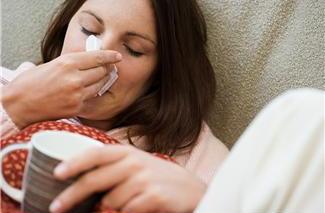Diabetes & the Flu
Diabetes & the Flu

But there are steps you can take to protect yourself.
- Get a flu shot! It’s the single best way to protect yourself against the flu. (Watch Video)
- Keep close track of your blood glucose. It can be affected by illness.
- If you have flu-like symptoms, call your doctor’s office or clinic right away. (Watch Video)
- Take flu medicine when your health care provider prescribes it.
- Follow special sick day rules for people with diabetes.
- Take everyday steps to protect your health.
People with diabetes should talk with their health care provider now to discuss preventing and treating the flu. People infected with the flu can pass it on to others a day or two before any signs appear. That’s why it is important to make sure the people around you get a flu shot as well.
Find the Flu Vaccine: HealthMap Vaccine Finder
Why does having diabetes put me at higher risk for getting the flu?
Diabetes can decrease your body’s ability to fight germs, such as the flu virus. It also puts you at an increased risk of flu-related problems like pneumonia. Being sick can raise your blood glucose and prevent you from eating properly.
How can I protect myself from getting the flu?
Getting the flu shot is the best way to protect yourself from getting the flu. (Watch Video)
If you have diabetes you should get the flu shot, not the nasal spray. The nasal spray is not safe for people with diabetes.
Because you have more of a chance of getting pneumonia, talk to your doctor about pneumonia shot to protect you. In addition to getting these shots, follow the Center for Disease Control’s CDC everyday steps to keep yourself healthy this flu season.
I think I have the flu. What should I do?
If you have any flu-like symptoms, contact your health care provider immediately. If you have the flu, your doctor can give you antiviral medicine to make you feel better faster. (Watch Video)
In addition to following the CDC’s treatment advice, you should:
- Continue taking your diabetes pills or insulin
- Test your blood glucose every 4 hours and write down your results
- Drink lots of calorie-free liquids to stay hydrated
- Try to eat your normal diet
- Weigh yourself every day. Losing weight without trying is a sign of high blood glucose.
Call you doctor, clinic, or go to the emergency room right away if you:
- Are unable to eat normally
- Go 6 hours without being able to keep food down
- Have severe diarrhea
- Lose 5 pounds or more
- Have a fever over 101o Fahrenheit
- Get a blood glucose reading lower than 60 mg/dL or more than 300 mg/dL
- Have trouble breathing
- Feel sleepy or can’t think clearly.
Related Links
Diabetes and the Flu (Flu.gov)
Flu and People with Diabetes (CDC)
Information for People with Diabetes (either type 1 OR type 2) and Their Caregivers (CDC)
Videos from Flu.gov
What is the best protection against the flu?
What are the symptoms of the flu?
What should I do when caring for someone with the flu?
What should I do if my child gets the flu?
How can I prevent the spread of the flu?
This article has been created from Diabetes and the Flu (Flu.gov) and Information for People with Diabetes and Their Caregivers (CDC).
For more information:
Go to the Cold and Flu health topic.